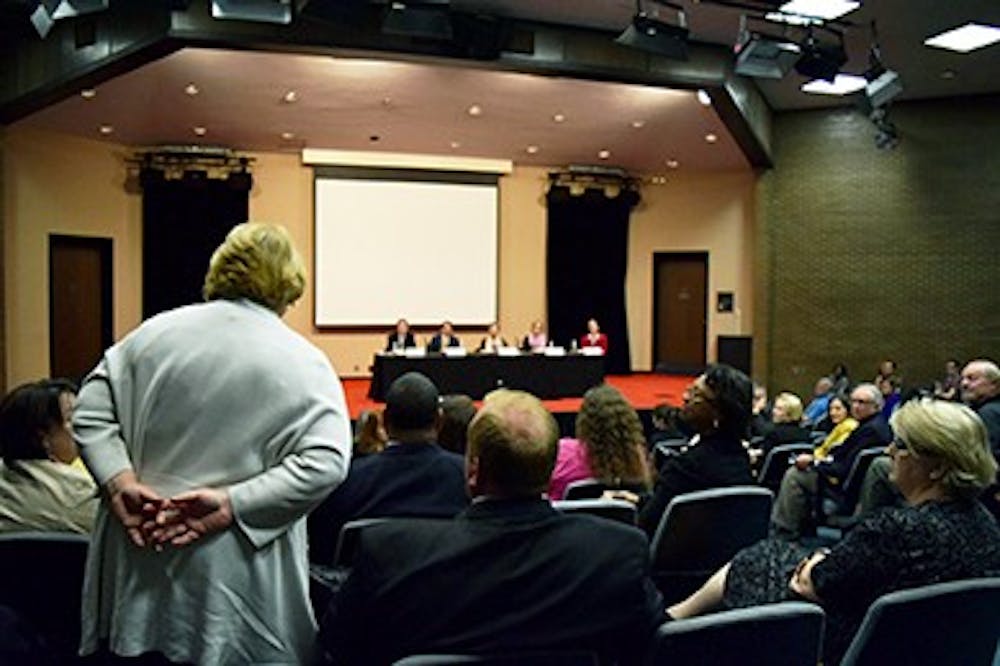College of Education and School of Law faulty led a discussion about policing in schools and the role of the school resource officer. Each faculty member spoke for an allotted time about a subtopic of policing in schools and then opened the floor to questions from the audience.
Education professor Kara Brown served
After seeing a video of an altercation between a school resource officer and a student at Spring Valley High School in Columbia, parents, educators and law enforcement officials tackled the question: "What is the role of a school resource officer?"
Gupta-Kagan began the discussion by connecting Ferguson, Missouri, and the altercation that occurred at Spring Valley High School. Gupta-Kagan's scholarship includes juvenile justice, and he has handled a lot of cases that involve disservice toward students.
Gupta-Kagan emphasized the long-term effects that come from juvenile records and convictions. With many routine discipline issues being treated as criminal issues, students are entered into the juvenile system and have that record follow them for life. Being in the juvenile court system decreases a student’s chance of graduating, and their juvenile record follows them beyond youth, into college and job applications, he said.
“It’s concerning to me to see kids get juvenile delinquency records when I think there are better ways to handle that,” Gupta-Kagan said. He presented three solutions to juvenile delinquency that results from discipline issues at school, one being stronger prohibition on school resource officers’ involvement in school discipline.
Stoughton discussed the role of the school resource officer and, more broadly, the role of a police officer. Being a former police officer, Stoughton emphasized the ambassadorial role that police officers have in the community. While a regular police officer has various roles from answering service calls to responding to emergencies, a school resource officer takes on many more roles.
School resource officers were originally put into schools to build relationships with the kids and assume to roles of counselor and mentor along with the roles a regular officer has, he said. After Columbine, school resource officers were then looked to for safety and emergencies instead of mentoring.
Stoughton encouraged drawing a line between what is considered a crime and what is a school discipline issue. Teachers, administrators and officers must be able to distinguish between an emergency situation and a matter of school discipline because that will determine how the situation is handled, he said. With a lack of research and information about police nationally and in schools, good policy is prevented from being created and used.
Christle focused on the school-to-prison pipeline and how the use of suspension in schools is an ineffective punishment. When a student is suspended, their chances of dropping out greatly increase. In terms of behavior, the punishment of suspension is a reinforcement of the behavior, and does not correct it.
“It would be nice next time to have a situation where we might have small group conversations and hear more from the public as well as panelists,” Christle said after the forum.
As an educator, Doyle is upset that a system exists where violence is possible in school. A former intern at Spring Valley High School, she found that the teachers and administration forget that they are dealing with children.
Doyle pointed out the racial disparities between how students of color are punished compared to white students. When it comes to these situations, she emphasized that teachers have the power to escalate or deescalate situations and can prevent what happened at Spring Valley from happening elsewhere.
Jennifer Tague, director of operations for South Carolina Equality Coalition, attended because she “wanted to find out more about the officers in the school, not only the racial disparities but with the LGBT side of it — which was not mentioned.” Tague hopes that by speaking up at the forum she can encourage discussion of LGBT disparities and that changes will be made.
After the speakers, members of the community were able to discuss the role of the school resource officer with a panel of experts and members of the school board and police department in hopes of finding an effective solution.

